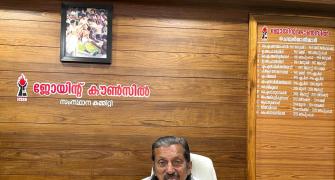India has indicated to Pakistan that executing its national Sarabjit Singh, on death row for his alleged involvement in 1990 bomb blasts in Lahore and Multan, is not the "best way to deal" with the issue as New Delhi sought consular access to the condemned prisoner.
A request for consular access to Sarabjit, who officials said will be hanged on April 1, has been sent to Pakistani authorities, Indian High Commission sources said.
It had been indicated to them that hanging him "might not be the best way to deal with the situation in the prevailing circumstances," sources said.
Top officials at Lahore's Kot Lakhpat jail, including its superintendent Javed Latif, said that they had received the death warrant for Sarabjit, who has been languishing in the prison for the last 17 years, and he would be executed on April 1.
Sarabjit's lawyer Rana Abdul Hamid said that there was "no legal option" left to save his client. Sarabjit could be saved only if President Pervez Musharraf granted him a pardon or if there was some "extraordinary understanding" between the Indian and Pakistani governments, Hamid said.
A mercy petition of Sarabjit, who Pakistan claims is Manjit Singh, was rejected by Musharraf on March 3. Indian authorities are engaged in efforts to convince their Pakistani counterparts to resolve the matter without executing Sarabjit, the official sources said.
Officials from the Indian High Commission were last granted consular access to Sarabjit in 2005.
Sarabjit was sentenced to death in 1991 for his alleged involvement in four bomb blasts in Lahore and Multan that killed 14 people.
His family denies he was a spy as claimed by Pakistan and insists he accidentally strayed into Pakistani territory. Sarabjit's mercy petition was sent to Musharraf along with that of Indian prisoner Kashmir Singh, who was pardoned and freed after spending 35 years on death row in Pakistani jails.
In his mercy petition, Sarabjit had sought his release on the grounds that he was innocent and wrongly implicated. The petition was rejected by the President after "thorough consideration" as the allegations against him "were proved and he was awarded capital punishment by court", sources said.
Pakistan's Supreme Court too rejected Sarabjit's plea for clemency in March 2006.







